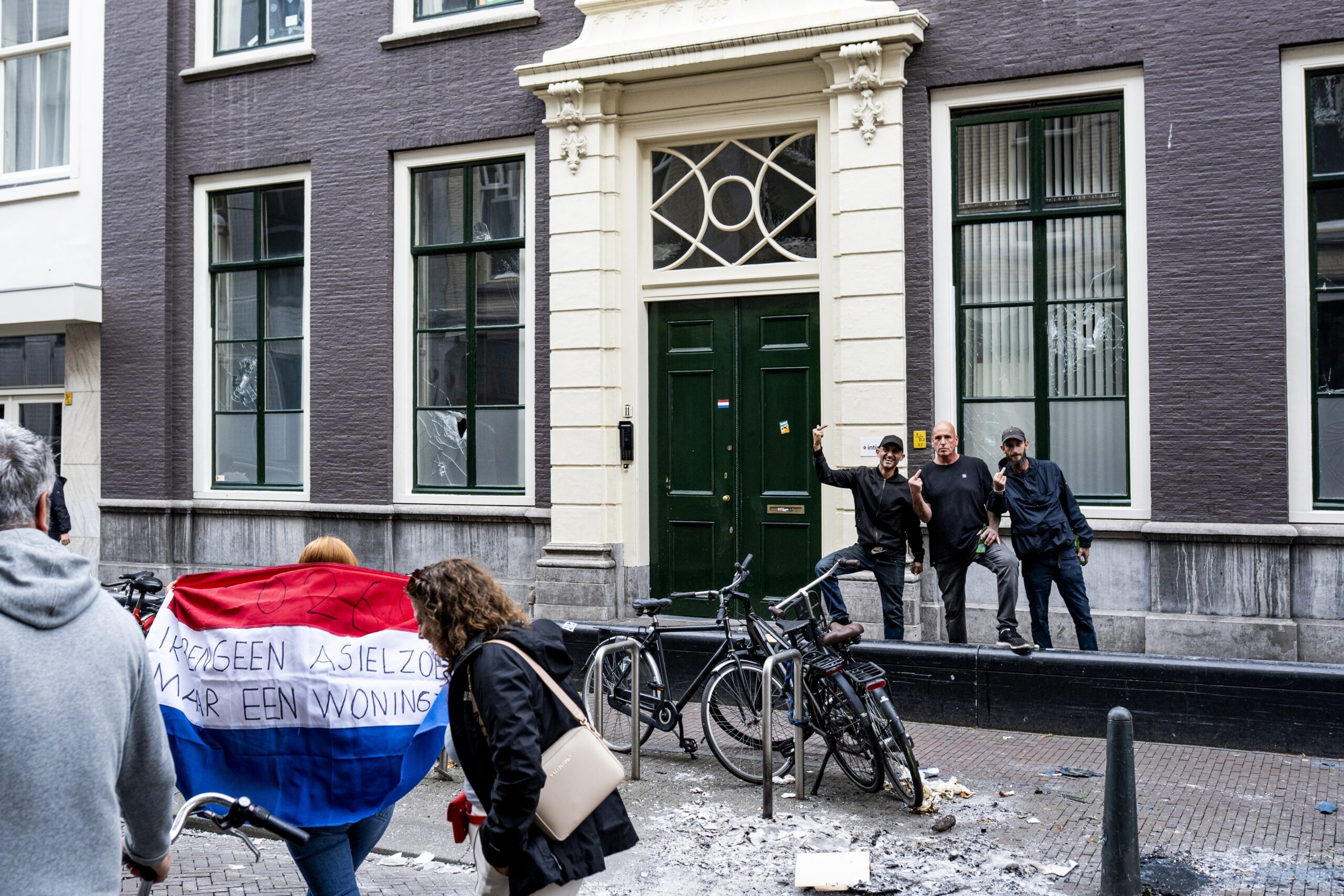Riots in The Hague blended far right with football hooliganism

Saturday’s riots in The Hague were co-ordinated by football hooligans operating under the banner of far-right organisations such as Defend Netherlands, experts on political violence have told Dutch media.
Around 1,200 demonstrators clashed with police, throwing stones, bottles and fireworks and setting vehicles on fire, as an anti-immigration demonstration on the Malieveld rapidly turned ugly.
A breakaway group headed towards the Binnenhof parliamentary complex, which is currently being renovated, smashing the windows of liberal party D66’s offices along the way. Police have made 37 arrests so far and say four officers were injured in the riots.
City mayor Jan van Zanen described the rioters as “groups of hooligans from all over the country” who “deliberately sought to confront the police” and used “extreme violence”.
Many of the rioters wore black, covered their faces and used co-ordinated “hit and run” tactics to attack police, which are common in football violence. Some carried Dutch flags bearing the names of clubs including Cambuur Leeuwarden and NAC Breda, or towns with strong hooligan presences such as Alkmaar, Groningen and The Hague.
Nazi flags and salutes
But the riots also had a political dimension: demonstrators chanted anti-asylum slogans and “wij zijn Nederland” (we are the Netherlands), made Nazi salutes and carried banners with the slogans “remigratie” and “send them home“.
Some of the flags had the orange band of the Prinsjesvlag, the forerunner of the modern Dutch tricolour that was favoured by the pre-war Dutch Nazi party NSB.
One banner read: “Clubrivaliteit aan de kant. Red Nederland.” [“Put our club rivalries aside and save the Netherlands.”]
Van Zanen said there was no evidence to support claims by some right-wing commenters that the Antifa movement, which the Dutch parliament last week voted to proscribe as a terrorist organisation, had infiltrated the demonstration.
However, the ultra-nationalist Defend Netherlands organisation, which emerged during the coronavirus pandemic and was involved in violent anti-lockdown demonstrations, was prominent at the protests.
Political ecosystem
Willemijn Kadijk, a researcher specialising in polarisation and radical movements, told AD.nl after witnessing the demonstration: “I saw an ecosystem of groups who think the Netherlands has to be protected.
“A section of these people think action needs to be taken and think that that legitimises violence against the police.”
The rioters were not directly associated with the political demonstration organised by the social media influencer Els Noort, known as “Els Rechts”, but there was a clear overlap between the two.
“Els Rechts” replied to a social media post by a group calling itself the Dutch Hooligan Scene the day before the protest, announcing their attendance, with the message: “See you tomorrow”.
Noort condemned the violence immediately afterwards, saying attacks on police were “not done” but said the rioting was “absolutely not my intention”.
“I am not responsible for the things that went wrong, but I want to say that I am really sickened by them,” she said.
Football networks
Jacqueline van Stekelenburg, chair of social change and conflict at the Vrije Universiteit Amsterdam, told AD.nl that three distinct groups were involved in the demonstration and the riots.
“There were people who responded to the appeal from Els Rechts and listened to the speeches, there was a group consisting of far-right organisations, and another section of hooligans who could be mobilised quickly through football networks,” she said.
Far-right politicians also moved quickly to disassociate themselves from the violence, including PVV party leader Geert Wilders, who turned down an invitation to speak at the event.
Wilders described the rioters as “scum” who should be “dealt with severely”. But he also attacked Frans Timmermans, leader of the left-wing alliance GL-PvdA, who called the violence in The Hague “Trumpian scenes fuelled by politicians who spread fear and division”.
Hate speech
Finance minister Eelco Heinen, of the right-wing liberal VVD, also dismissed the idea that the rioting was politically motivated. “These were hooligans; it’s got nothing to do with politics,” he said.
Heinen was critical of D66 leader Rob Jetten, who denounced “politicians who engage in hate speech” as he stood outside the offices of his party where the windows had been boarded up after the attack. “We need politicians who bring people together,” Heinen said.
Jetten replied on TV current affairs show Buitenhof: “We can’t take this seriously. They weren’t shouting ‘Come on ADO’ or ‘Come on FC Utrecht’, they were chanting slogans about claiming the Netherlands.”
Thank you for donating to DutchNews.nl.
We could not provide the Dutch News service, and keep it free of charge, without the generous support of our readers. Your donations allow us to report on issues you tell us matter, and provide you with a summary of the most important Dutch news each day.
Make a donation